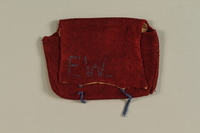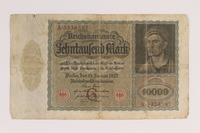Overview
- Description
- Correspondence: postcards received by Fanni Reznicki while she was interned as a slave laborer in Ober Altstadt, a sub-camp of the Gross-Rosen concentration camp; postcards sent by Regina Wohlgeschaffen (donor's mother?) in Jaworzno, Poland, all dated 1942. Fanni was in slave labor through May 1945, when she was liberated and returned to Sosnowiec, Poland; Poland and Czechoslovakia; in German. Photographs and letters kept in bag made by Fanni in Ober Altstadt.
- Date
-
1942-1945
- Credit Line
- United States Holocaust Memorial Museum Collection, Gift of Fanni Reznicki
- Collection Creator
- Fanni Reznicki
- Biography
-
Fanni Wolhgeschaffen was born on February 15, 1926, in Gelsenkirchen, Germany, to Chaim and Regina Wolhgeschaffen. Chaim was born near Stryj, Poland, on May 3, 1903, and Regina was born in Rzeszów, Poland, in 1905. The family moved to Chorzów, Poland, when Fanni was five years old. Fanni had a younger sister, Lusia, born in 1932.
Not long after the Germans occupied Poland in September 1939, Fanni and her family were forced into the Jaworzno ghetto. Fanni was arrested and deported to an all-women’s concentration camp in 1942. She was warned by other inmates to stay healthy so that she would be transferred to a sub camp of Gross-Rosen concentration camp that had better living conditions. Fanni was deported to Ober Altstadt concentration camp in Czechoslovakia where she served as forced labor in a textile factory. Her block leader at the camp tried to get Fanni’s mother and sister sent to Ober Altstadt, but did not succeed. Fanni received a postcard from her mother stating that she was too afraid to travel to Ober Altstadt. She and Lusia did try to go to Sosnowiec, thinking it would be better. But conditions were terrible there also, so they returned to Jaworzno. Not long afterwards, they were deported to Auschwitz concentration camp, where they perished in 1942. Her father, Chaim, fled to the Soviet Union after escaping a mass killing of Jews in the ghetto by German authorities.
Fanni was liberated by the Soviet Army during a forced march from Ober Altstadt on May 10, 1945. A non-Jewish Czech worker she knew from the textile factory offered to help Fanni if she had no other place to go. They ran away from the Soviet forces who liberated the camp. She returned to her family’s home in Katowice, but there was a Polish family living there and she was too scared to stay. Fanni went to live with friends in the Jewish community of Sosnowiec, a smaller city within Katowice. She met a man who had escaped from the Stryj ghetto and he told her that he had seen her father recently in the town. She reunited with her father, and they relocated to Germany in 1945. Fanni was able to get to Palestine that year with the assistance of Betar, a Revisionist Zionist youth organization. Her father, who had married his half-sister, Esther, and had a daughter, arrived there later. Fanni married Nachum Reznicki. Nachum was born in 1920 in Bolkovisc, Poland, near the Soviet Union and had been a member of the underground during the war.
Physical Details
- Genre/Form
- Postcards. Photographs.
- Extent
-
3 folders
Rights & Restrictions
- Conditions on Access
- There are no known restrictions on access to this material.
- Conditions on Use
- Material(s) in this collection may be protected by copyright and/or related rights. You do not require further permission from the Museum to use this material. The user is solely responsible for making a determination as to if and how the material may be used.
Administrative Notes
- Holder of Originals
-
United States Holocaust Memorial Museum
- Legal Status
- Permanent Collection
- Provenance
- The collection was donated to the United States Holocaust Memorial Museum in 2007 by Fanni Reznicki.
- Record last modified:
- 2023-02-24 14:18:22
- This page:
- http://collections.ushmm.org/search/catalog/irn519040
Download & Licensing
- In Copyright - Use Permitted
- Terms of Use
- This record is not digitized and cannot be downloaded online.
In-Person Research
- Request 7 Days in Advance of Visit
- Plan a Research Visit
-
Request in Shapell Center Reading Room
Bowie, MD
Contact Us
Also in Fanni Reznicki collection
The collection consists of artifacts, documents, and photographs relating to the experience of Fanni Wolhgeschaffen and her family in the Jaworzno ghetto in Krakow, Poland, and in several concentration camps during the Holocaust.
Date: 1922-1945

Red monogrammed knit purse made by Fanni Reznicki in a forced labor camp
Object
Purse made by 17-year-old Fanni Wolhgeschaffen when she was a slave laborer in Ober Altstadt concentration camp in Czechoslovakia. She worked in a textile factory and made the bag from fabric remnants. After the German occupation of Poland in September 1939, Fanni and her family were imprisoned in the Jaworzno ghetto. In 1942, Fanni was deported to an all-women’s concentration camp and then to Ober Altstadt. The German authorities evacuated the camp in May 1945, and while on that forced march, the prisoners were liberated by the Soviet Army on May 10. Fanny returned to Poland where she was reunited with her father; they soon relocated to Germany. She learned that her mother and younger sister had been murdered in Auschwitz concentration camp in 1942. Fanni was able to get to Palestine in 1945 with the assistance of Betar, a Revisionist Zionist youth organization. Her father arrived there later.

Weimar Germany Reichsbanknote, 10000 mark note owned by Fanni Reznicki
Object
German Reichsbank note, valued at 10,000 marks, that belonged to 17-year-old Fanni Reznicki. The front medallion depicts German artwork, Portrait of a Young Man, created by Renaissance artist Albrecht Dürer. After the German occupation of Poland in September 1939, Fanni and her family were imprisoned in the Jaworzno ghetto. In 1942, Fanni was deported to an all-women’s concentration camp and then to Ober Altstadt concentration camp. The German authorities evacuated the camp in May 1945, and while on that forced march, the prisoners were liberated by the Soviet Army on May 10. Fanny returned to Poland where she was reunited with her father; they soon relocated to Germany. She learned that her mother and younger sister had been murdered in Auschwitz concentration camp in 1942. Fanni was able to get to Palestine in 1945 with the assistance of Betar, a Revisionist Zionist youth organization. Her father arrived there later.



